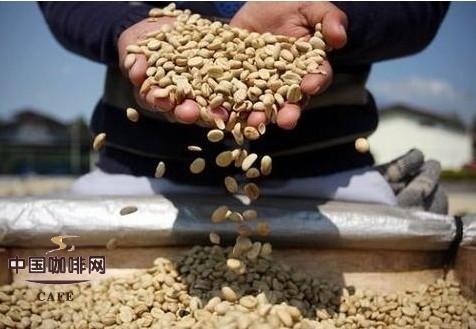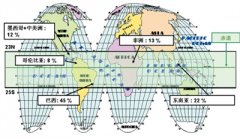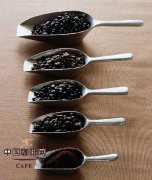What is the difference between Arabica and Robusta's different coffee beans?

In many places where coffee is sold, it is not difficult to find words like "100% Arabica". Even canned coffee appears in a style called "XX Arabica Coffee", which makes one wonder: what is "Arabica Coffee"?
In fact, Arabica is the name of the coffee tree variety (species).
"Coffea Arabica" and "Coffea Robusta" are two different coffee varieties, which currently account for the vast majority of coffee bean production in the world. There are three main differences between Arabica coffee and Robusta coffee: 1. Differences in planting conditions. two。 The flavor and characteristics are different. 3. The difference between market price and use.
Planting condition difference
The planting conditions of "Arabica" coffee are relatively stringent, requiring higher elevations (6 to 2000 meters above sea level), fertile soil fertility, adequate moisture, proper sunshine conditions and shade. "Arabica" coffee species are less resistant to diseases and insect pests and are vulnerable to damage. In addition, the annual output of coffee trees per unit area is also lower.
Currently, "Arabica" coffee accounts for 75% of the world's coffee production, and of these "Arabica" coffee production, only 10% of Arabica coffee quality can be classified as "boutique coffee (Specialty Coffee)."
"Robusta" coffee, commonly known as "sturdy beans", can be grown at low elevations (200 to 800 meters above sea level), has strong resistance to diseases and insect pests, is not vulnerable to agricultural disasters, has a high annual output per unit area, and is harvested in large quantities by machine. in general, the cost of production is much lower than that of Arabica coffee.
Different flavors and characteristics
Arabica coffee has a varied and broad potential flavor. Arabica coffee produced in different regions, different elevations and different climates usually has its own characteristics and can show a completely different flavor. "Arabica" coffee smells like grass when it is not roasted. After proper roasting, it shows "fruity" (medium-light roasting) and "caramel sweetness" (deep roasting). Generally speaking, it has a better aroma and flavor than Robusta beans.
"Robusta" coffee usually has an ordinary, rigid and pungent flavor, and because the vast majority of robusta around the world are grown in low-altitude areas (author's note: as of May 2008, only India has rare high-altitude, high-quality, washed Robusta coffee beans). The flavor produced by different regions and different climates is not very different, relatively lack of personality. When unbaked, it smells like raw peanuts, and the taste of cheap robusta coffee beans is usually between "wheat tea" (light baking) and "rubber tire flavor" (deep roasting). It is difficult to show fine flavor.
Difference between market price and use
High-quality Arabica coffee requires a cumbersome process of hand picking, selection and fine processing, so the world's most expensive and best coffee beans are Arabica coffee. "Robusta" coffee is usually used to produce instant coffee and canned coffee because of its low cost. A small number of better quality "Robusta" coffee are also used in mixed coffee (with Arabica coffee) espresso beans.
Other differences
There is another important difference: the amount of "Caffeine" (C8H10N4O2). Robusta coffee contains about twice as much caffeine as Arabica coffee, which is why drinking some canned coffee is prone to palpitations and insomnia.
After seeing so many differences between Arabica Coffee and Robusta Coffee, we must finally emphasize:
"Arabica coffee" is not the same as "good coffee", "Robusta" is not absolutely cheap coffee!
Arabica coffee accounts for 75% of the world's coffee production, and its quality varies widely, from good to bad. In recent years, a few countries (such as India) have devoted themselves to improving the quality of robusta coffee. They have planted robusta in high altitude areas, given the most careful care, and carefully washed the coffee. As a result, they get very good quality robusta coffee beans! Top Robusta beans are not cheap either, getting rid of the old impression that Robusta are cheap beans! Therefore, the quality of coffee beans can no longer be judged by the crude and outdated ancient criterion of "Arabica beans".
Important Notice :
前街咖啡 FrontStreet Coffee has moved to new addredd:
FrontStreet Coffee Address: 315,Donghua East Road,GuangZhou
Tel:020 38364473
- Prev

Arabica grows Arabica coffee beans fine coffee beans
If Arabica coffee beans are favored by God, Robusta is the devil's booger, because of the market's love of Arabica coffee. Arabica can become the aristocrat of coffee beans and enjoy the highest honor as the most precious variety, depending on the high standards of its plant's growing environment. Allah
- Next

Time / temperature curve of things to pay attention to in coffee roasting
When baking the time / temperature curve, it is recommended to record the corresponding temperature at regular intervals, with intervals ranging from 30 seconds to 60 seconds according to personal habits. In addition to temperature, such as the start and end time of the first and second explosions are also indispensable records. Based on these data, a time-temperature curve can be sorted out, which is an important reference data for baking, as long as
Related
- Beginners will see the "Coffee pull flower" guide!
- What is the difference between ice blog purified milk and ordinary milk coffee?
- Why is the Philippines the largest producer of crops in Liberia?
- For coffee extraction, should the fine powder be retained?
- How does extracted espresso fill pressed powder? How much strength does it take to press the powder?
- How to make jasmine cold extract coffee? Is the jasmine + latte good?
- Will this little toy really make the coffee taste better? How does Lily Drip affect coffee extraction?
- Will the action of slapping the filter cup also affect coffee extraction?
- What's the difference between powder-to-water ratio and powder-to-liquid ratio?
- What is the Ethiopian local species? What does it have to do with Heirloom native species?

